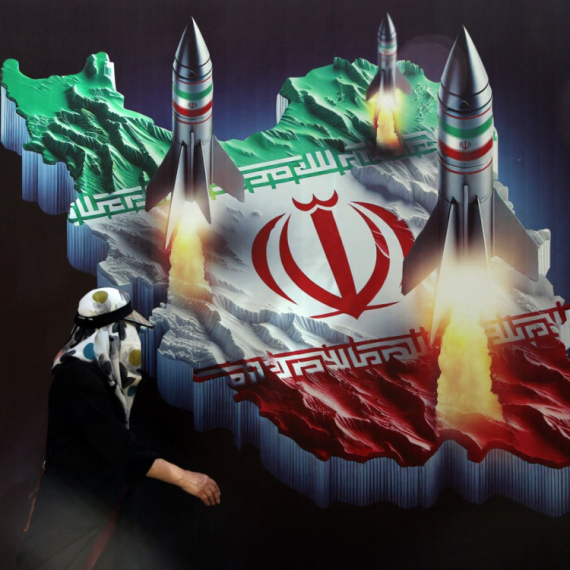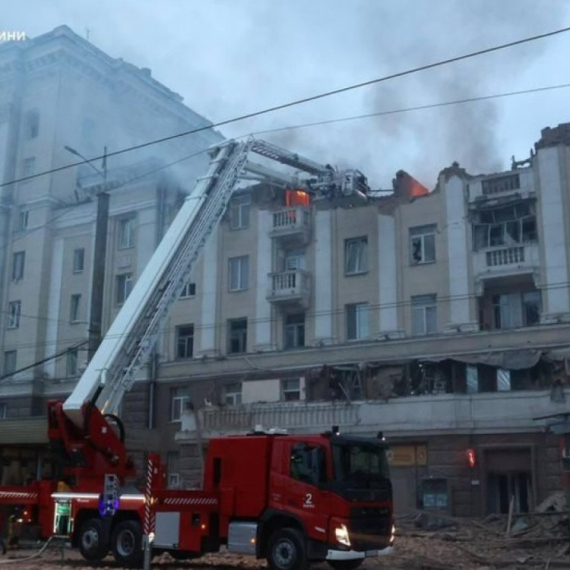Responsible response
Monday, 23.02.2009.
13:01

Responsible response The signs of economic crisis are all around us. But the poorest countries and people are in the biggest danger. Tight credit and a global recession are eroding government revenues and cutting their ability to meet education, health and gender goals. Remittances are slowing. Foreign and domestic investment is frozen. Trade is falling. Social unrest is rising. Estimates suggest a 1 per cent drop in developing country growth rates which traps 20 million more people in poverty. Already 100 million have been driven into poverty as a result of last year's slow down. So, who can turn the situation around for the better? There are a lot of doctors, but it will be the response of the leaders of the world’s biggest economies that will set the course. Where do we want them to take us? As Robert Zoellick, the President of the World Bank, recently argued we need an era of responsible globalization, where inclusivity and sustainability take precedence over the enrichment of a few. That means a focus on creating growth that includes opportunities for the poor, technological development, microfinance and lending to small entrepreneurs, trade accords that benefit both sides and commitment to delivering the aid that has been promised. We would like to live in a world of financial responsibility at all levels of society: individual, national and international. We need a plan that reopens credit markets, addresses bad loans so that banks can be recapitalized and the financial system can once again go about its business of funding enterprise. But funding sensibly, not flouting the fundamental principles of credit that got us into this mess in the first place. Turning in on ourselves is not the answer either. It would be the worst possible response which would further exacerbate the crisis, just like it did during the depression in the first half of 20th century. It is precisely at this time that we should seek to expand trade and shun protectionism. Responsible multilateralism where countries and institutions seek practical solutions to interdependent problems is what we need now. Initiatives to strike agreements on humanitarian food supplies, energy prices or taxes that encourage investment in cleaner sources and conservation of energy are but some examples of how we could achieve better quality growth. This is an opportunity for us to seek the responsible stewardship of the global environment. How can we get there? The major responsibility lies with leaders of the biggest and most powerful economies; from USA, to Russia, EU, India, Japan, and Brazil to China…They need to lead the way in changing attitudes to promote a coordinated policy response to stimulate economic growth while significantly strengthening the integrity system which regulates finance, trade and sustainable development. International financial institutions should give new emerging economies a greater say in the management and oversight of global finance. The cure has to be global, not just a western one. Special attention should be given to the poor. We see the need for at least three types of interventions: strengthening safety nets to help cushion the impact of the downturn on the most vulnerable; investment in infrastructure to build a foundation for productivity and growth while putting people to work; and finance for small and medium-sized enterprises to create jobs. One can, of course, ask where the money is going to come from to help the neediest. As a first step, developed countries should agree to devote 0.7 per cent of their stimulus packages to a vulnerability fund to support the neediest in developing countries. This would be a major step forward, sending a clear signal to the world that we are all in this problem together, and we will only solve it together. Ok, you can say: “Why would I care?” Well, everybody should care. No corner of the globe will be shielded from this crisis. Markets for Serbian goods are vulnerable. When people are not buying cars, Serbian steel has fewer customers. Demand for tires falls. Both of these Serbian exports, among many others, will take a hit. More sluggish export performance will obviously influence Serbia’s ability to import goods and services needed to maintain production and expansion. Export growth in the last quarter was just 1.4 percent while import actually declined by 4.2 percent. But that is not all: layoffs of workers in developed countries will affect people here. Some 115 000 households in Serbia receive remittances. If their relatives working in developed countries are fired from a job, this money will stop coming. Living standards for many will deteriorate in the coming months. Last year the number of employed in industry declined by about 5 percent. The impact of the downturn on the poor is immediate. Some preliminary analysis shows that in the past a decline in growth of 5 percent in South-East Europe was matched by an increase poverty of more than 10 percent. As much as wise and courageous leadership is needed around the globe to get us through this crisis, so also is it needed in Serbia. The starting position of Serbia is not bad: it has a program with the IMF; its financial system suffered a few blows but stayed on its feet. Government has not adopted a laager mentality - it strives to expand trade with the EU and Eastern markets, while investing in infrastructure and facilitating access to credit for entrepreneurs. Serbia’s core problem in this crisis is one of funding. Past growth (unfortunately driven by consumption, not investment) was funded by inflows of foreign direct investment (FDI) and external private sector borrowing. Both of which will now slow down quite considerably. It is not realistic to assume that funding gap can be completely filled by domestic savings (Serbia has low savings rates) and concessionary credits from international finance institutions to the same levels achieved in inflows from FDI and external private borrowing in the past. Something will have to be cut back. Public expenditures will come under increasing pressure and my fear is that programs that help the poor will suffer. I know government has limited ability to maneuver, but when expenditures are once again reviewed we should strive to make sure that those expenditures which support the genuinely needy are protected. Simon Gray is World Bank Country Manager in Serbia Regional leaders discuss the crisis in Belgrade (FoNet, file) You know how people say here: “A healthy person has thousands of wishes; a sick person has only one”. Well, the global economy has only one wish now – to get well soon. Simon Gray "As much as wise and courageous leadership is needed around the globe to get us through this crisis, so also is it needed in Serbia. The starting position of Serbia is not bad: it has a program with the IMF; its financial system suffered a few blows but stayed on its feet."
Responsible response
The signs of economic crisis are all around us. But the poorest countries and people are in the biggest danger. Tight credit and a global recession are eroding government revenues and cutting their ability to meet education, health and gender goals. Remittances are slowing. Foreign and domestic investment is frozen. Trade is falling. Social unrest is rising. Estimates suggest a 1 per cent drop in developing country growth rates which traps 20 million more people in poverty. Already 100 million have been driven into poverty as a result of last year's slow down.So, who can turn the situation around for the better? There are a lot of doctors, but it will be the response of the leaders of the world’s biggest economies that will set the course. Where do we want them to take us?
As Robert Zoellick, the President of the World Bank, recently argued we need an era of responsible globalization, where inclusivity and sustainability take precedence over the enrichment of a few. That means a focus on creating growth that includes opportunities for the poor, technological development, microfinance and lending to small entrepreneurs, trade accords that benefit both sides and commitment to delivering the aid that has been promised.
We would like to live in a world of financial responsibility at all levels of society: individual, national and international. We need a plan that reopens credit markets, addresses bad loans so that banks can be recapitalized and the financial system can once again go about its business of funding enterprise. But funding sensibly, not flouting the fundamental principles of credit that got us into this mess in the first place. Turning in on ourselves is not the answer either. It would be the worst possible response which would further exacerbate the crisis, just like it did during the depression in the first half of 20th century.
It is precisely at this time that we should seek to expand trade and shun protectionism. Responsible multilateralism where countries and institutions seek practical solutions to interdependent problems is what we need now. Initiatives to strike agreements on humanitarian food supplies, energy prices or taxes that encourage investment in cleaner sources and conservation of energy are but some examples of how we could achieve better quality growth. This is an opportunity for us to seek the responsible stewardship of the global environment.
How can we get there? The major responsibility lies with leaders of the biggest and most powerful economies; from USA, to Russia, EU, India, Japan, and Brazil to China…They need to lead the way in changing attitudes to promote a coordinated policy response to stimulate economic growth while significantly strengthening the integrity system which regulates finance, trade and sustainable development. International financial institutions should give new emerging economies a greater say in the management and oversight of global finance. The cure has to be global, not just a western one.
Special attention should be given to the poor. We see the need for at least three types of interventions: strengthening safety nets to help cushion the impact of the downturn on the most vulnerable; investment in infrastructure to build a foundation for productivity and growth while putting people to work; and finance for small and medium-sized enterprises to create jobs.
One can, of course, ask where the money is going to come from to help the neediest. As a first step, developed countries should agree to devote 0.7 per cent of their stimulus packages to a vulnerability fund to support the neediest in developing countries. This would be a major step forward, sending a clear signal to the world that we are all in this problem together, and we will only solve it together.
Ok, you can say: “Why would I care?” Well, everybody should care. No corner of the globe will be shielded from this crisis. Markets for Serbian goods are vulnerable. When people are not buying cars, Serbian steel has fewer customers. Demand for tires falls. Both of these Serbian exports, among many others, will take a hit. More sluggish export performance will obviously influence Serbia’s ability to import goods and services needed to maintain production and expansion. Export growth in the last quarter was just 1.4 percent while import actually declined by 4.2 percent.
But that is not all: layoffs of workers in developed countries will affect people here. Some 115 000 households in Serbia receive remittances. If their relatives working in developed countries are fired from a job, this money will stop coming. Living standards for many will deteriorate in the coming months. Last year the number of employed in industry declined by about 5 percent. The impact of the downturn on the poor is immediate. Some preliminary analysis shows that in the past a decline in growth of 5 percent in South-East Europe was matched by an increase poverty of more than 10 percent.
As much as wise and courageous leadership is needed around the globe to get us through this crisis, so also is it needed in Serbia. The starting position of Serbia is not bad: it has a program with the IMF; its financial system suffered a few blows but stayed on its feet. Government has not adopted a laager mentality - it strives to expand trade with the EU and Eastern markets, while investing in infrastructure and facilitating access to credit for entrepreneurs. Serbia’s core problem in this crisis is one of funding. Past growth (unfortunately driven by consumption, not investment) was funded by inflows of foreign direct investment (FDI) and external private sector borrowing. Both of which will now slow down quite considerably.
It is not realistic to assume that funding gap can be completely filled by domestic savings (Serbia has low savings rates) and concessionary credits from international finance institutions to the same levels achieved in inflows from FDI and external private borrowing in the past. Something will have to be cut back. Public expenditures will come under increasing pressure and my fear is that programs that help the poor will suffer. I know government has limited ability to maneuver, but when expenditures are once again reviewed we should strive to make sure that those expenditures which support the genuinely needy are protected.
Simon Gray is World Bank Country Manager in Serbia


























Komentari 1
Pogledaj komentare